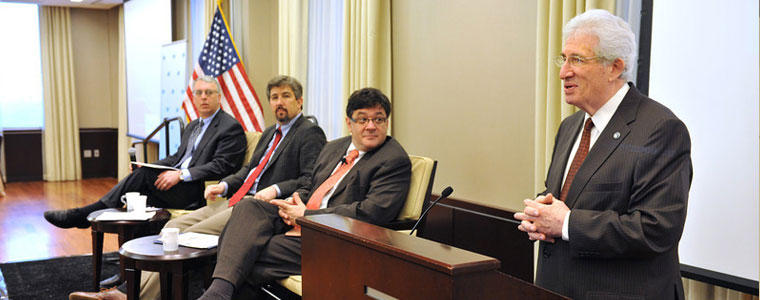A panel discussion hosted by USIP and the Reserve Officers Association Capitol Hill with USIP experts and the foreign affairs correspondent for The Wall Street Journal.

More than a year after the Arab Awakening began, Iran appears to be doubling-down on its commitment to the regime of Syrian President Bashar al-Assad, still clinging to power. At the same time, both Syria and Iran are making the calculation that the Obama administration will not seriously entertain a military intervention in either country in an election year.
Against this backdrop, the United States Institute of Peace (USIP) and the Reserve Officers Association hosted a discussion on Capitol Hill with Jay Solomon, foreign affairs correspondent at the Wall Street Journal, and the USIP’s own Dan Brumberg, a senior adviser specializing in Iran. USIP’s Steve Heydemann moderated the event on March 21, “Challenging the Axis of Resistance: Syria, Iran and the Strategic Balance in the Middle East.”
But despite rising tensions in the region, Iran and Syria assume the U.S. is not in a position to do anything to counter them just now, said Solomon.
“My sense is that Iranians know Obama doesn’t want a war this year… and Syrians know the U.S. isn’t interested” in a military operation either – a dynamic that reinforces itself, one off the other. Talks on nuclear issues later this year might help to ameliorate tensions, even if they are not substantive.
“This is going to be a year of kicking the can down the road,” Solomon said.
Gen. James Mattis, head of U.S. Central Command, testified to Congress earlier this month that Iran was flying weapons and experts into Syria in a “full-throated effort … to keep Assad there and oppressing his own people.” But when the Assad regime fails, Mattis said, “it’ll be the biggest strategic setback for Iran in 20 years.”
How long Iran remains committed to Syria is an open question. It largely depends on what direction Iran sees the wind blowing, how long the Assad regime can survive, and who or what might replace it. For now, the Iranians are waiting to see how history unfolds knowing the U.S. is largely distracted by the American political calendar.
“I think they also recognize … that it may very well be after the elections that [Obama] will have a stronger hand in the region,” Brumberg said.
USIP and ROA host a continuing series of events on Capitol Hill. The next event will focus on the rise of Islamists governments in the Middle East.